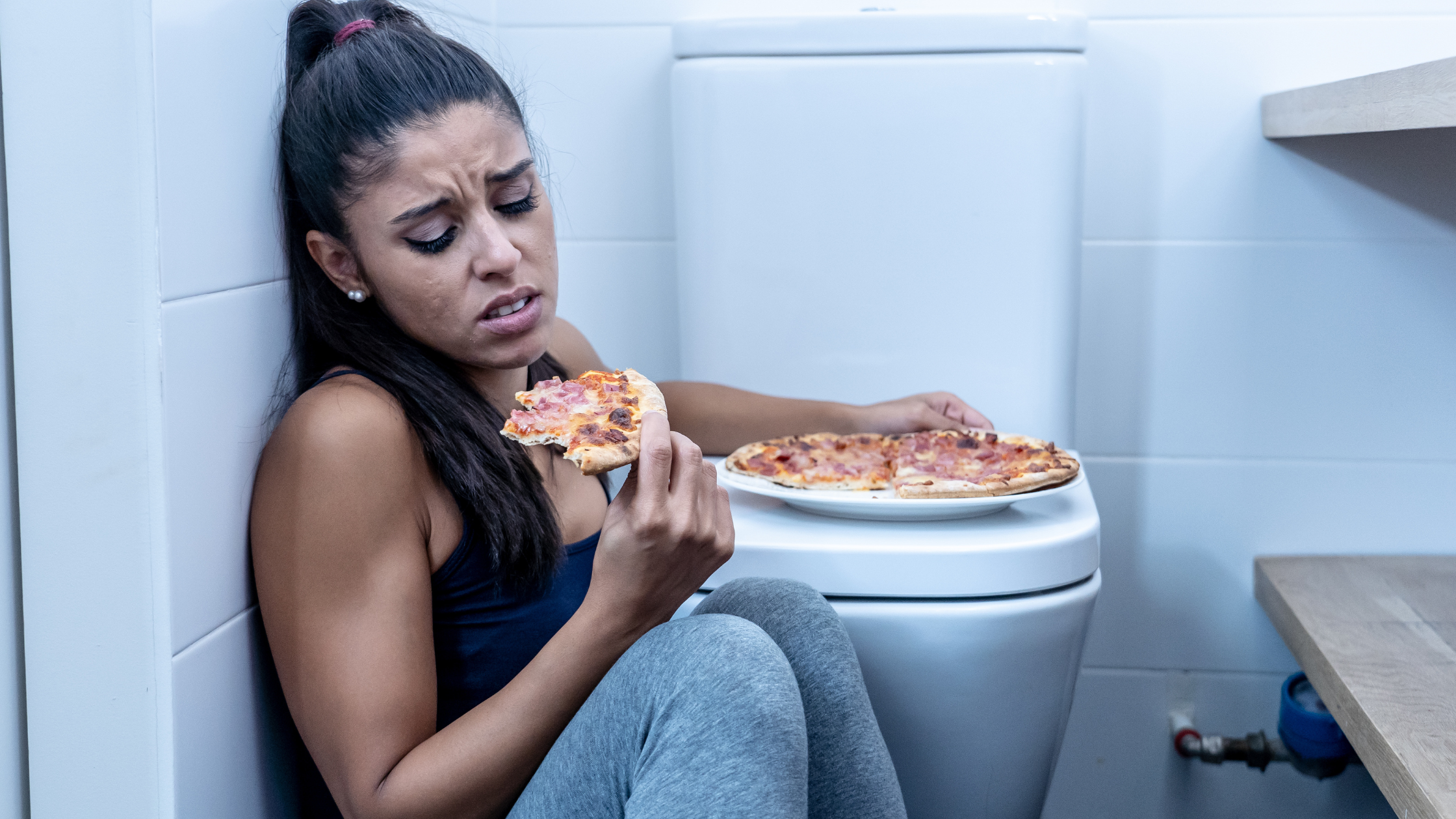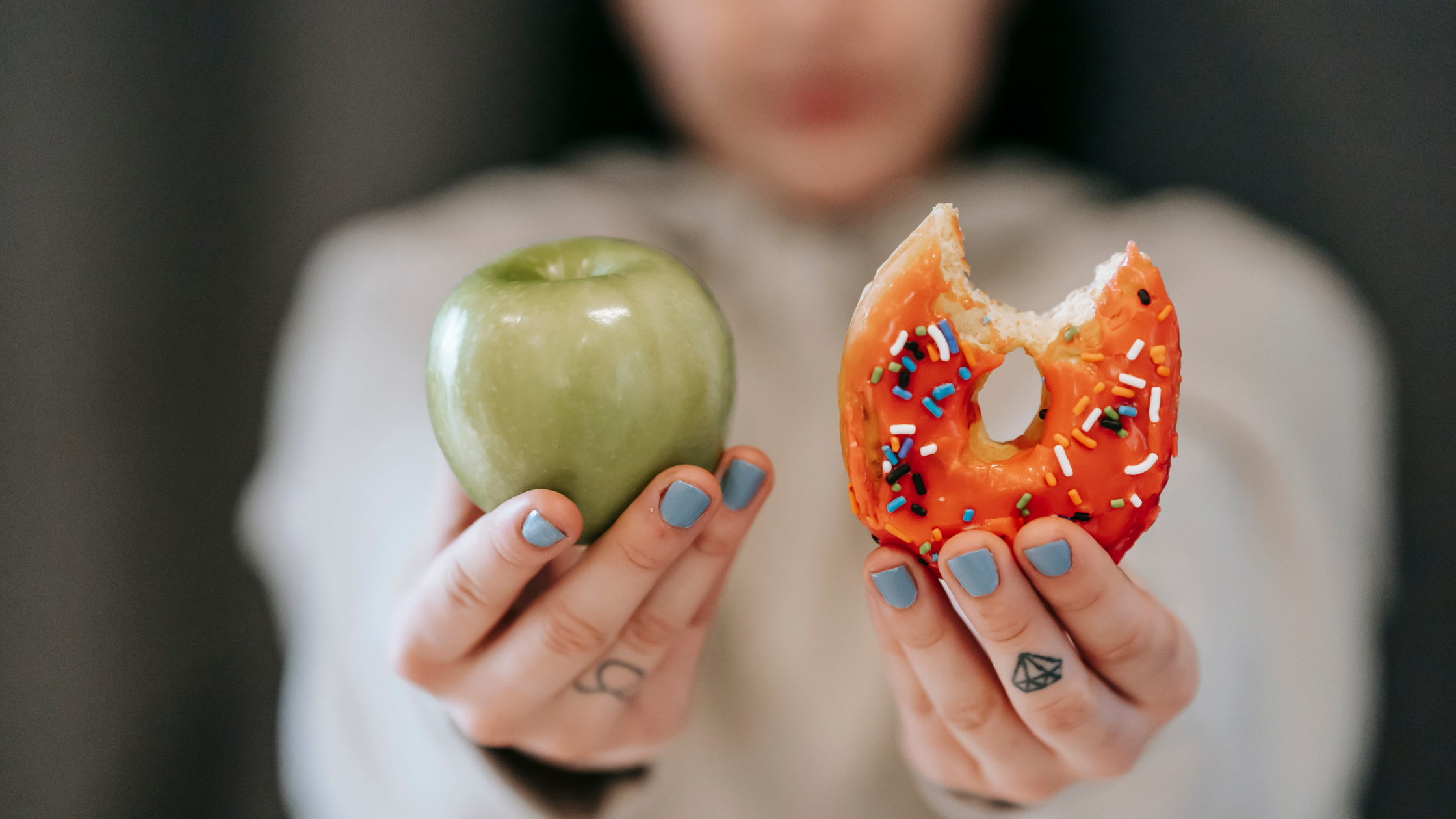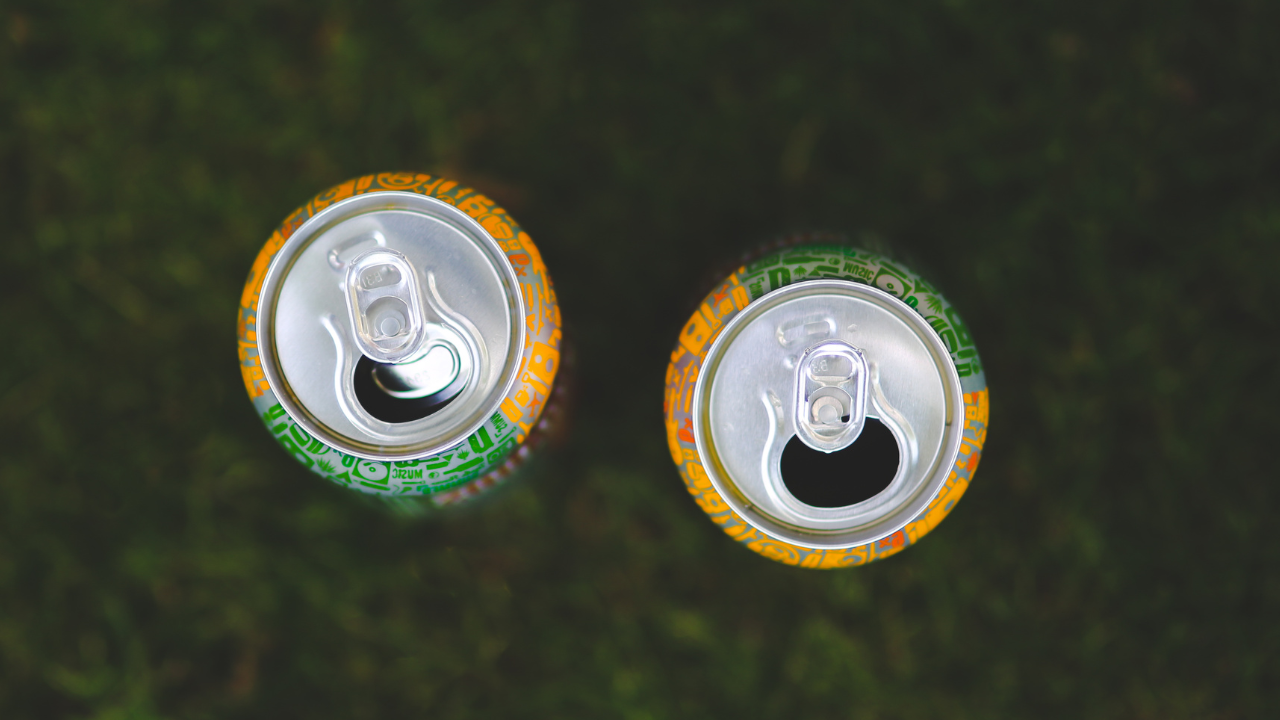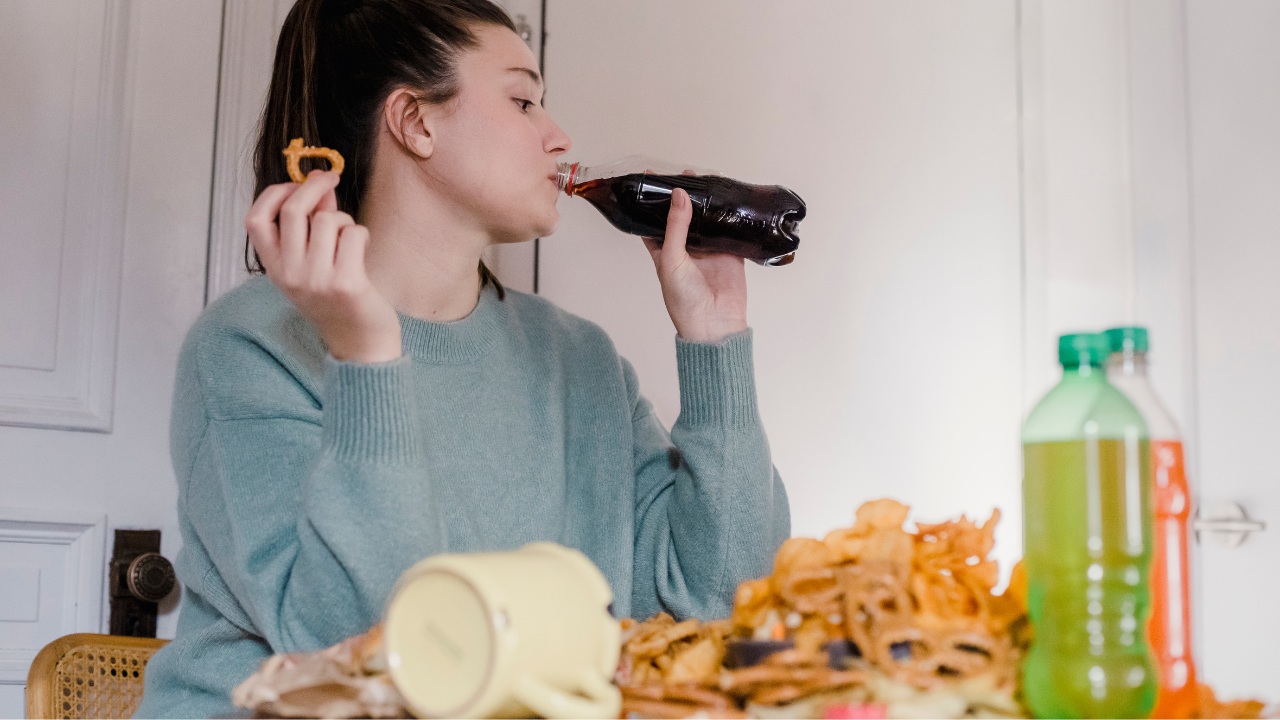Can Intuitive Eating Help with Binge Eating?
Binge eating happens for so many different reasons - as a coping strategy, due to habit, in response to a weight loss diet, or any combination of the above. Binge eating is an uncomfortable and disorienting experience that often leaves you feeling guilty, ashamed, and out of control in your own body. This might lead to you starting a new diet in order to regain that sense of control. And this diet likely leads to even more binge eating.
It is a very vicious cycle, but there is a way out! Intuitive eating and making peace with food can help pave the path to recovery.
If you’re new here, hello and welcome! My name is Hannah and I am a non-diet dietitian here to help you improve your relationship with your food and finally find food freedom.
In this blog we will cover:
What is binge eating?
What causes binge eating?
What to do after a binge
How to prevent binge eating
Is binge eating recovery possible?
Can intuitive eating help with binge eating?
How to incorporate intuitive eating to help with binge eating
A big disclaimer before we go on: it is important to seek out professional help if you suspect that you have binge eating disorder. This post will include many tips for overcoming binge eating, but it is not a replacement for professional treatment.
What is binge eating?
Binge eating is when you eat a large amount of food in a short period of time. This is not the same as eating an extra slice of pizza or having dessert after dinner even though you feel pretty full - it’s more than that. Binge eating involves feeling out of control and ashamed of the behavior. You may find that you binge eat when you are alone because you are embarrassed about the it and feel disgusted and guilty afterwards.
Binge eating can happen to anyone and you may have experienced it yourself. Recurrent episodes of binge eating may mean that you have binge eating disorder.
Binge eating disorder
Binge eating disorder (BED) is an eating disorder that involves eating large quantities of food (typically to the point of discomfort) and it is accompanied by feelings of loss of control, shame, guilt, and distress. There are many health consequences of BED, including weight cycling (and weight stigma), gastrointestinal issues, poor sleep, and anxiety and depression.
BED is the most common eating disorder in the U.S. BED is not the same as binge eating or overeating, nor is it an addiction to food. Let’s discuss the differences.
Binge eating disorder vs. binging
Both binging and BED involve eating large quantities of food accompanied by feelings of shame and guilt. The difference is the frequency of the binge episodes. For the behavior to be diagnosed as BED, the binges occur at least once per week (on average) for three months.
Binge eating disorder vs. overeating
It is possible to overeat without binging. BED and overeating are not the same thing. Overeating is simply eating past fullness. I actually try to avoid using the term “overeating” in my practice as a non-diet dietitian because it implies that there is a set point of fullness that you should always stop eating at and that just isn’t true. While it wouldn’t feel good to eat past comfortable fullness on a regular basis, it’s normal to do it once in a while. Think about Thanksgiving or perhaps trying a new restaurant while on vacation. Overeating and eating past fullness is not something to worry about or to feel any shame about.
Is binge eating an addiction to food?
Believe it or not, there is no such thing as food addiction. I discuss it in depth in this post. Now, if you struggle with what feels like food addiction, my heart goes out to you! I am not trying to take away from your lived experiences.
I think some better terms to describe this feeling of food addiction could be food obsession, food fixation, or food preoccupation. But food addiction is technically not a thing. We need food to survive, and I would argue that you cannot be addicted to something that is required for survival.
Food preoccupation is very frequently a result of dieting, restricting, and disordered eating behaviors. Feeling this way is very valid and unfortunately very common. It is possible to take the power back from food.
So no, binge eating is not the result of an addiction to food. This feeling of addiction is likely due to a disordered relationship with food.
What causes binge eating?
It is important to remember that there are many causes of binge eating. And none of them are due to lack of “willpower”, “discipline”, or because of food addiction.
Generally speaking, there are two main reasons why binge eating happens - biological causes and emotional causes.
Biological causes of binge eating
Chronic dieting and food restriction is a large reason why people binge eat. Our bodies have compensatory mechanisms in place for when we diet and limit our food intake. When you diet, you may notice that food sounds so much more appealing. You experience cravings, it feels like you can never fill up, and you can’t stop thinking about when your next meal will be. This is due to hormonal and metabolic changes that occur when you go on a diet. It may seem like your body is trying to sabotage you, but these responses are a good thing. It is your body’s way of protecting you. The human species simply would not survive if the body was not able to adapt to periods of undereating.
When you do not give your body the fuel that it needs, it will work hard to make sure that you do. For some people, this shows up in the form of binge eating.
Emotional causes of binge eating
Along with biological compensatory mechanisms, emotional binge eating is very common. Binge eating is a coping mechanism for many. Turning to food helps some people (temporarily) feel better when negative emotions arise.
Family history and trauma can also be risk factors for BED.
Remember, BED is not a lack of “willpower” and there are likely many compounding factors that may lead to binges.
What to do after a binge
Be kind to yourself
It is important to cope with kindness after a binge. Be gentle with yourself. I know, this is easier said than done. But beating yourself up for the binge is only going to make it more difficult to break the restrict-binge cycle.
Get curious about the situation
What happened leading up to the binge? Do you notice any patterns from previous binge episodes? Try not to be judgmental here and instead reflect and investigate in order to learn about your binge eating triggers.
Stay off the scale
Avoid weighing yourself. I discuss many reasons why I don’t recommend weighing yourself here, but staying off the scale is especially important if you want to break the restrict-binge cycle.
After a binge, it would make total sense that your weight would be temporarily increased due to eating food. It’s not a bad thing that the number went up! It will balance out over time. Even if your rational brain understands this concept, seeing the number after a binge when you may not be mentally at your best could be a trigger for restriction. Why go looking for information that isn’t helpful?
How to prevent binge eating
Preventing a binge will require understanding the root cause of binge eating episodes. One common reason for binging is chronic dieting and food restriction. It is easier said than done, but it is going to be essential to ditch the diets and make peace with food.
Avoid the diets
Stay away from any diet plan that promises quick results, cuts out any foods, or labels foods as “good” or “bad”. Both the physical and mental restriction of such diets can be a very large trigger for binge eating.
Eat enough (and consistently)
Going too long without eating as well as not eating enough overall leaves your body no choice but to send you loud signals that it needs fuel. These signals can come in the form of cravings and, of course, binge eating. Again, this is not your body’s way of sabotaging you! Your body just needs regular intake to operate at its best.
Eat fiber and protein
Protein and fiber are both key nutrients in helping us stay satisfied. This is something I teach inside The Nutrition Reboot membership. Try to include both (or at least one) of these at each meal and snack as able and notice how much more staying power these foods give you.
Is binge eating disorder recovery possible?
Recovery from BED is possible. It is important to remember that recovery is complicated and will likely take time and work and will be best achieved with the help and support of a team of eating disorder specialists.
Getting to the root cause of your binging will be a large factor in recovery.
Can intuitive eating help with binge eating?
Yes, intuitive eating can help with binge eating. Intuitive eating and Health at Every Size are very beneficial approaches in disordered eating and eating disorder recovery. But it won’t be as simple as just telling yourself to “eat intuitively” and “love your body” - intuitive eating involves unlearning the diet mentality, examining your beliefs about weight and body size, making peace with all foods, and more. Recovery from disordered eating and eating disorders is a complex process that is best tackled with the support of a trained team.
Eating disorders do a good job of disconnecting us from our innate hunger and fullness cues, which may make intuitive eating seem like a difficult feat.
How to incorporate intuitive eating to help with binge eating
Honor your hunger
It’s normal for dieters to have a lack of trust with their body’s hunger cues, so this may fee like a tough one. Don’t worry - you can get these hunger cues back, even if they seem to be nonexistent.
Human bodies tend to function best when fed every 3-4 hours. Try to eat consistently throughout the day and not skip meals. Allowing yourself to get too hungry can be a trigger for a binge, especially if it is compounded by emotional factors.
Incorporate your fear foods
Making peace with food will be essential for binge eating recovery. This not only includes eating foods that have previously been deemed “off limits”, but also giving yourself mental permission to eat these foods. It’s not as simple as me saying “just eat the cake!” You must take such foods off of their pedestal and remove the guilt from the equation. You truly can enjoy all foods. Believing this to be true will allow you to have these foods in the house without binging on them.
Ditch the dieter’s tools
Tools such as the scale and your calorie counting app can make your binge eating and distrust with your body worse. The bathroom scale and MyFitnessPal provide your brain with external sources of information that are used to determine what, when, and how much to eat. But intuitive eating is all about tuning in to internal signals. How can you learn to trust what your body is telling you when external pieces of information is contradicting what your body is trying to communicate?
Add gentle movement
Moving your body in ways that feel good and bring you joy can help to prevent binges and also help you to relieve some uncomfortable feelings after a binge. But remember, this movement cannot be used to “work off” the calories consumed during the binge or as a punishment for the binge. This takes away from the pleasure and joy that can come with movement.
Consider therapy
Therapy is a great resource for many reasons, including in binge eating treatment. Working with a mental health therapist can offer you support and tools to assist in your recovery. As able, try to find a therapist that aligns with intuitive eating practices and Health at Every Size.
Bottom line - will intuitive eating help with binge eating?
Intuitive eating may be an effective treatment for binge eating, especially when accompanied by professional support. By helping you to make peace with food and learn to honor your hunger, intuitive eating can help you to build trust with your body.



































